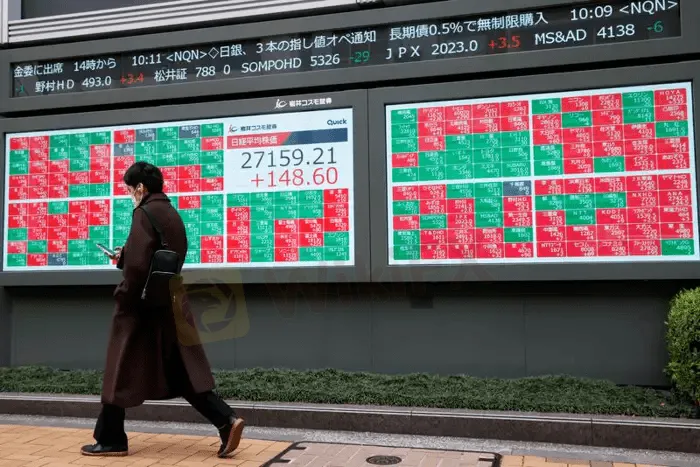简体中文
繁體中文
English
Pусский
日本語
ภาษาไทย
Tiếng Việt
Bahasa Indonesia
Español
हिन्दी
Filippiiniläinen
Français
Deutsch
Português
Türkçe
한국어
العربية
Volatility subsides after Credit Suisse rescue, but fears remain
Abstract:A volatile day looms in Asia on Monday, as investors’ relief at a rescue deal for Credit Suisse and co-ordinated support from global central banks was tinged with nerves over how deep troubles run in the world’s banking and financial system.

European futures rose 0.5% and S&P 500 futures rose 0.4% in bumpy trade. FTSE futures rose 0.3%. In cash trading a bounce for banks in Tokyo retraced and most markets in Asia lost ground.
MSCIs broadest index of Asia-Pacific shares outside Japan fell 0.6%.
While the volatility has subsided for now, investors remained fearful about what could happen next after a week in which a systemic lender in one of Europes financial capitals was brought to its knees by the turmoil in the bond market resulting from the collapse of Silicon Valley Bank.
Over the weekend, UBS said it will buy Credit Suisse for 3 billion francs ($3.2 billion) and assume up to $5.4 billion in losses, a shotgun merger engineered by Swiss authorities that investors hope can head off an even bigger mess in global markets.
“The market‘s taken a positive view that that’s one area of concern thats been cauterized,” said Jason Wong, a senior strategist at BNZ in Wellington.
“But it doesnt solve the U.S.-banking specific issues, where deposits are going out the door into safer banks,” he said.
“We‘ve got to get confidence back into that banking sector, and probably more needs to be done or a week from now we’ll still be facing the same sorts of issues.”
Central banks including the U.S. Federal Reserve, the European Central Bank and Bank of Japan on Sunday pledged support for market liquidity by increasing the frequency of seven-day U.S. dollar-swap operations from weekly to daily.
The BOJ said there were no bids for dollars during its operation on Monday, potentially a positive sign if it signals there isnt urgent demand.
The central banks assurances were enough to steady selling without reversing it.
Japans Nikkei fell 0.4% and the Hang Seng fell 0.9%, with Hong Kong financials down 1%. Financials in Australia fell 0.7%.
U.S. Treasuries were sold too, to wind back some of last weeks wild rally. Dealers said the outlook remains clouded by the fragility of banking confidence.
Stability risks
Investors still face a situation that remains unnerving on several counts.
Firstly, authorities efforts to calm things down havent been entirely successful yet and have also drawn attention to the scale of problems.
Banks sought record amounts of emergency liquidity from the Federal Reserve last week and depositors seem skittish.
Secondly, Credit Suisse shareholders have taken heavy losses and some bondholders appear to be left with nothing after the bank said some 16 billion francs in debt will be written down to zero – raising risks for exposure to banks everywhere.
“Investors are trying to price out stability risks, but also having to process having their assets written down to save depositors,” said Damien Boey, chief equity strategist at Sydney-based investment bank Barrenjoey.
“The key question is whether solvency or liquidity concerns are sufficiently addressed by bailout/merger attempts to make deposit runs stop. The answer isnt clear yet.”
One positive on Monday were yen cross-currency swaps, a measure of non-U.S. investor demand for dollars. They shrank to minus 35 basis points or half their levels last week, in a hint of some respite in market funding conditions.
Benchmark 10-year Treasury yields rose nine basis points to 3.49%. Two-year yields rose 10 bps to 3.94%. U.S. interest rate futures were bouncing around, and by mid morning in Hong Kong had pared half their early losses.
Ahead of a Federal Reserve meeting on Wednesday, markets were pricing about a 60% chance of a 25 bp rate hike before embarkibng on a series steady rate cuts as early as June.
Rates pricing is likely to remain volatile while there is concern over regional banks in the United States. A U.S. official said on Sunday that deposit outflows had slowed and in some cases reversed.
But first First Republic also had its credit rating pushed deeper into junk status by S&P Global and elsewhere efforts to raise capital were hitting difficulties.

Disclaimer:
The views in this article only represent the author's personal views, and do not constitute investment advice on this platform. This platform does not guarantee the accuracy, completeness and timeliness of the information in the article, and will not be liable for any loss caused by the use of or reliance on the information in the article.
Read more

XTB Hack 2025: Major Security Breach Exposes Client Accounts
XTB suffers a major hack in 2025, with hackers draining client accounts and sparking urgent security upgrades. Learn how the breach unfolded and what’s next.

XTB Hack 2025: Major Security Breach Exposes Client Accounts
XTB suffers a major hack in 2025, with hackers draining client accounts and sparking urgent security upgrades. Learn how the breach unfolded and what’s next.

Want to Succeed in Forex? Start with the Right Trading System
If you want to trade currencies and make money in the long run, you need a good forex trading system. Many new traders enter the market without a clear plan. Some rely on luck or tips from others. But trading without a system often leads to losses.

Mumbai Police Nabs Black Paper Dollar Conversion Forex Scam Perpetrators: Check Out the Details
The crime branch of the Mumbai Police has nabbed a racket involved in duping people by claiming to convert black paper into dollars. Check this unique 24.7-lakh scam story.
WikiFX Broker
Latest News
US Government Interest Grows in Victory Metals’ Rare Earths Supply
How Are Trade Policies Affecting the Aluminum Market?
RM71,000 Lost in a Share Scheme That Never Existed
Scammed by a Click: He Lost RM300,000 in a Month
Manual vs. Automated Forex Trading: Which One Should You Choose?
Revealing Factors That Help Determine the Gold Price in India
Why Regulatory Compliance Is the Secret Ingredient to Trustworthy Forex Brokers
Pentagon to become largest shareholder in rare earth miner MP Materials; shares surge 40%
Delta shares jump 12% after airline reinstates 2025 profit outlook as CEO says bookings stabilized
Delta shares jump 13% after airline reinstates 2025 profit outlook as CEO says bookings stabilized
Currency Calculator


